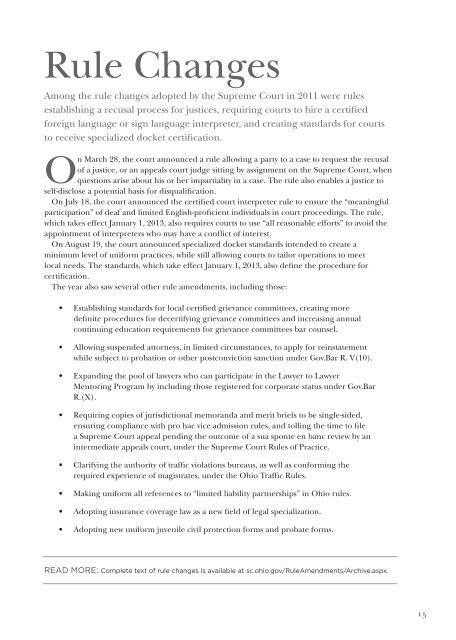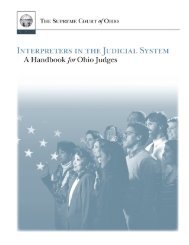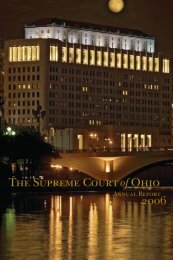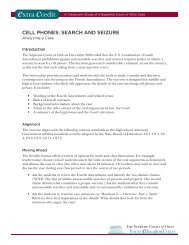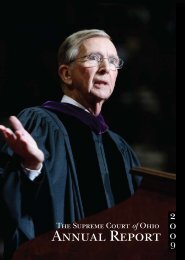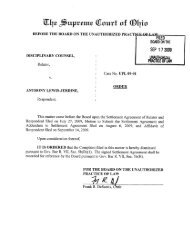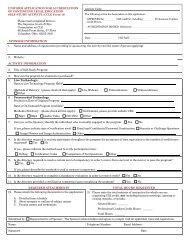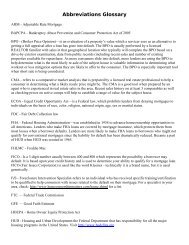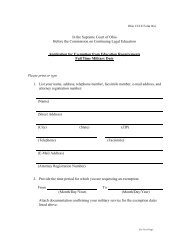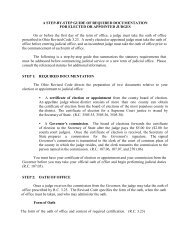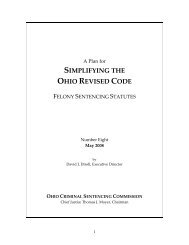Supreme Court of Ohio 2011 Annual Report
Supreme Court of Ohio 2011 Annual Report
Supreme Court of Ohio 2011 Annual Report
Create successful ePaper yourself
Turn your PDF publications into a flip-book with our unique Google optimized e-Paper software.
Rule Changes<br />
Among the rule changes adopted by the <strong>Supreme</strong> <strong>Court</strong> in <strong>2011</strong> were rules<br />
establishing a recusal process for justices, requiring courts to hire a certified<br />
foreign language or sign language interpreter, and creating standards for courts<br />
to receive specialized docket certification.<br />
On March 28, the court announced a rule allowing a party to a case to request the recusal<br />
<strong>of</strong> a justice, or an appeals court judge sitting by assignment on the <strong>Supreme</strong> <strong>Court</strong>, when<br />
questions arise about his or her impartiality in a case. The rule also enables a justice to<br />
self-disclose a potential basis for disqualification.<br />
On July 18, the court announced the certified court interpreter rule to ensure the “meaningful<br />
participation” <strong>of</strong> deaf and limited English-pr<strong>of</strong>icient individuals in court proceedings. The rule,<br />
which takes effect January 1, 2013, also requires courts to use “all reasonable efforts” to avoid the<br />
appointment <strong>of</strong> interpreters who may have a conflict <strong>of</strong> interest.<br />
On August 19, the court announced specialized docket standards intended to create a<br />
minimum level <strong>of</strong> uniform practices, while still allowing courts to tailor operations to meet<br />
local needs. The standards, which take effect January 1, 2013, also define the procedure for<br />
certification.<br />
The year also saw several other rule amendments, including those:<br />
• Establishing standards for local certified grievance committees, creating more<br />
definite procedures for decertifying grievance committees and increasing annual<br />
continuing education requirements for grievance committees bar counsel.<br />
• Allowing suspended attorneys, in limited circumstances, to apply for reinstatement<br />
while subject to probation or other postconviction sanction under Gov.Bar R. V(10).<br />
• Expanding the pool <strong>of</strong> lawyers who can participate in the Lawyer to Lawyer<br />
Mentoring Program by including those registered for corporate status under Gov.Bar<br />
R.(X).<br />
• Requiring copies <strong>of</strong> jurisdictional memoranda and merit briefs to be single-sided,<br />
ensuring compliance with pro hac vice admission rules, and tolling the time to file<br />
a <strong>Supreme</strong> <strong>Court</strong> appeal pending the outcome <strong>of</strong> a sua sponte en banc review by an<br />
intermediate appeals court, under the <strong>Supreme</strong> <strong>Court</strong> Rules <strong>of</strong> Practice.<br />
• Clarifying the authority <strong>of</strong> traffic violations bureaus, as well as conforming the<br />
required experience <strong>of</strong> magistrates, under the <strong>Ohio</strong> Traffic Rules.<br />
• Making uniform all references to “limited liability partnerships” in <strong>Ohio</strong> rules.<br />
• Adopting insurance coverage law as a new field <strong>of</strong> legal specialization.<br />
• Adopting new uniform juvenile civil protection forms and probate forms.<br />
READ MORE: Complete text <strong>of</strong> rule changes is available at sc.ohio.gov/RuleAmendments/Archive.aspx.<br />
15


